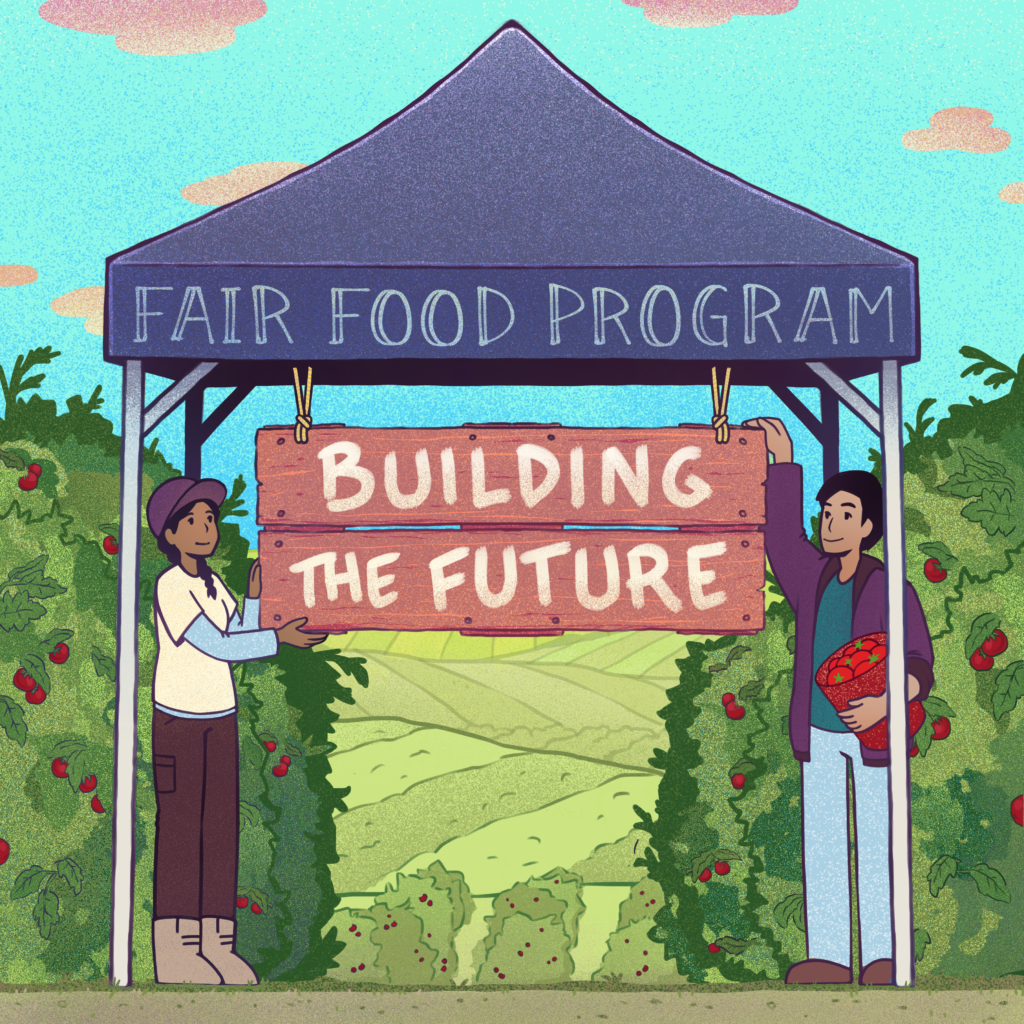TODAY: Donate to help build a future of dignity, fairer wages, and respect for workers’ rights in the fields and beyond!
As 2022 winds to a close, we want to take a moment to reflect with you on 10 incredible years of unprecedented human rights progress under the Fair Food Program, and under the broader model for human rights protections to which the FFP gave rise, the Worker-driven Social Responsibility model, as well. And we want to look to the future, too.
First, we need to set the scene. Nearly thirty years ago, farmworkers in Immokalee began meeting in a borrowed room at the Our Lady of Guadalupe Church to discuss the abuses and exploitation they faced every day in the fields, and how they could come together to build a fairer agricultural industry. Combining everything from radio broadcasts on the CIW’s community station, Radio Conciencia, to street theater illuminated by truck headlights staged in open lots across the community, farmworkers in the small, dusty crossroads town of Immokalee built the foundation of consciousness and commitment needed for real, sustainable change.
Nearly 20 years later, in 2011, that foundational work gave rise to the Fair Food Program, a groundbreaking approach to worker-led human rights monitoring and enforcement that has, over the ensuing decade, achieved results that would have been simply unimaginable for generations of farmworkers. Over the past 10 years, the FFP has effectively eliminated a wide range of extreme abuses in the fields — longstanding human rights violations, from sexual assault to modern-day slavery — and drastically reduced many more common, less egregious farm labor abuses, from wage theft to health and safety violations. And it has done so through the leadership of tens of thousands of workers in the fields, in partnership with dozens of major growers and 14 of the largest food buyers in the world, whose purchasing power is harnessed by workers, every hour of every day, to report violations without fear of retaliation. Through this pioneering program, workers have uncovered countless abuses and identified hundreds of bad actors, chipping away, complaint by complaint, audit by audit, at all the agricultural industry’s rough edges, leaving a more modern, more humane industry standing in its stead in Florida — and in fields now stretching across nine other states and multiple crops.
Now, we need your help to build the future of the Fair Food Program. Our goal is to raise $100,000 by year’s end in order to strengthen our movement for farmworkers’ fundamental human rights. Are you able to contribute $10 toward our campaign today?
Not only has the CIW pioneered a new form of human rights protections in the Fair Food Program over the past 10 years, we have also vigorously supported organizations across the country and around the globe in adapting the Worker-driven Social Responsibility model to the industries where they work — on dairy farms, at construction sites, and in textile factories, just to name a few. And in 2023, we will be stretching our efforts even further, building on a burgeoning partnership with an international federation of unions, human rights organizations, and major retail food brands to establish a pilot “Fair Fish Program” for migrant fishers in the United Kingdom, and breaking new ground in the cut flower greenhouses and produce fields of Chile, South Africa, and Mexico.
Just as we were determined to transform the tomato industry 30 years ago, today we are determined to build a world in which every worker has the opportunity to enjoy enforceable human rights protections at work – because we know the FFP and WSR models work, and because we know that, even right here in Florida, just beyond the reach of the Fair Food Program’s protections, forced labor, wage theft, sexual harassment and assault, and other egregious human rights abuses remain unchecked. Indeed, just a few months ago, the federal government brought yet another modern-day slavery ring to justice in the case of US vs. Moreno – a harrowing forced labor operation that the CIW, once again, uncovered and helped investigate.
And for each modern-day slavery case the CIW and federal prosecutors bring to light, many, many more untold stories of suffering and abuse continue in the dark.
After 30 years of tireless organizing in Immokalee and a decade of the Fair Food Program’s documented results, we have a proven solution. We must now expand our efforts and build a future in which all women and men who harvest our food are free from forced labor, free from abuse, and accorded the respect and dignity they deserve. And through the Worker-driven Social Responsibility model and its own track record of success on now three continents, we can extend those same protections and dignity at work to millions of more workers around the globe.
But we can’t do it alone. In order to turn this vision — and promise — of a better world into a reality, here in the U.S. and around the world, the CIW urgently needs your support.

